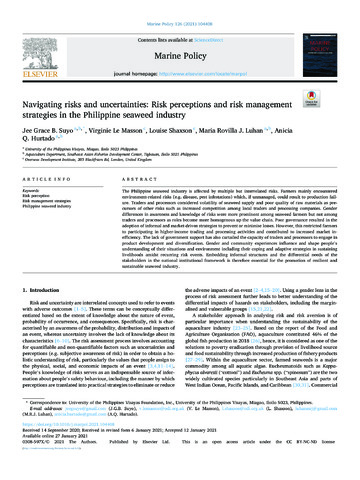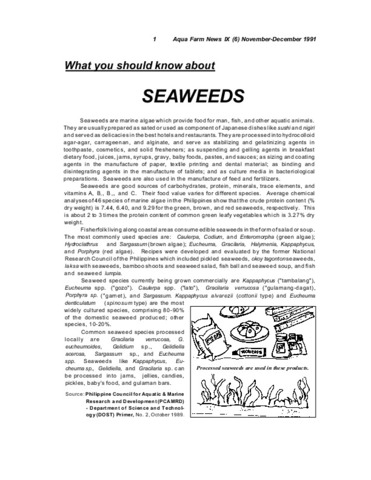Perlihatkan publikasi sederhana
Establishing adaptive strategies towards a climate-resilient seaweed farming: A case in Panobolon Island, Guimaras, Philippines
| dc.contributor.author | Castel, Raisa Joy G. | |
| dc.date.accessioned | 2019-01-03T03:41:36Z | |
| dc.date.accessioned | 2019-10-21T04:01:41Z | |
| dc.date.available | 2019-01-03T03:41:36Z | |
| dc.date.available | 2019-10-21T04:01:41Z | |
| dc.date.issued | 2018 | |
| dc.identifier.citation | Castel, R. J. G. (2018). Establishing adaptive strategies towards a climate-resilient seaweed farming: A case in Panobolon Island, Guimaras, Philippines. Fish for the People, 16(3), 24-27. | en |
| dc.identifier.issn | 1685-6546 | |
| dc.identifier.uri | http://hdl.handle.net/20.500.12066/4331 | |
| dc.description.abstract | Seaweeds are ecologically important primary producers, competitors, and ecosystem engineers (Harley et al., 2012), support complex food webs in coastal zones, and provide habitats and food for associated organisms, from apex predators to invertebrates (Reisewitz, Estes, & Simenstad, 2006). Seaweeds are intimately linked to human cultural and economic systems via the provision of ecosystem goods and services ranging from food, medicine, to cosmetics (Pickering, 2006) and storm protection (Rönnbäck, et al., 2007). There is strong scientific consensus that coastal marine ecosystems, along with the goods and services they provide, are threatened by anthropogenic global climate change (IPCC, 2001). However, the impacts of ongoing and future anthropogenic climate change in seaweeddominated ecosystems remain poorly understood (Harley et al., 2012). It is therefore, timely and relevant to provide better understanding of the experiences of seaweed farmers and their capacity to anticipate, cope with, resist, and recover from the impact of natural hazards (Blaikie, Cannon, Davis, & Wisner, 1994). The Philippine-based SEAFDEC/AQD is currently conducting a three-year (2015-2018) study on the economic benefits and losses of seaweed farming due to climate change indicators. With pilot site in Panobolon Island, Nueva Valencia, Guimaras, Philippines, the study highlights the adaptive strategies and the effects of climatic change on the productivity of small-scale seaweed growers in a community. | en |
| dc.language.iso | en | en |
| dc.publisher | Secretariat, Southeast Asian Fisheries Development Center | en |
| dc.subject | Philippines | en |
| dc.title | Establishing adaptive strategies towards a climate-resilient seaweed farming: A case in Panobolon Island, Guimaras, Philippines | en |
| dc.type | magazineArticle | en |
| dc.citation.volume | 16 | |
| dc.citation.issue | 3 | |
| dc.citation.spage | 24 | |
| dc.citation.epage | 27 | |
| dc.citation.journalTitle | Fish for the People | en |
| dc.subject.asfa | seaweeds | en |
| dc.subject.asfa | seaweed culture | en |
| dc.subject.asfa | climate change | en |
| dc.subject.asfa | ecosystem resilience | en |
Files in this item
| Files | Size | Format | View |
|---|---|---|---|
| CastelRJG2018.pdf | 339.1Kb | application/pdf | View/ |
Publikasi ini ada di koleksi berikut
-
Fish for the People [41]
These articles were contributed by SEAFDEC/AQD staff to Fish for the People Magazine



